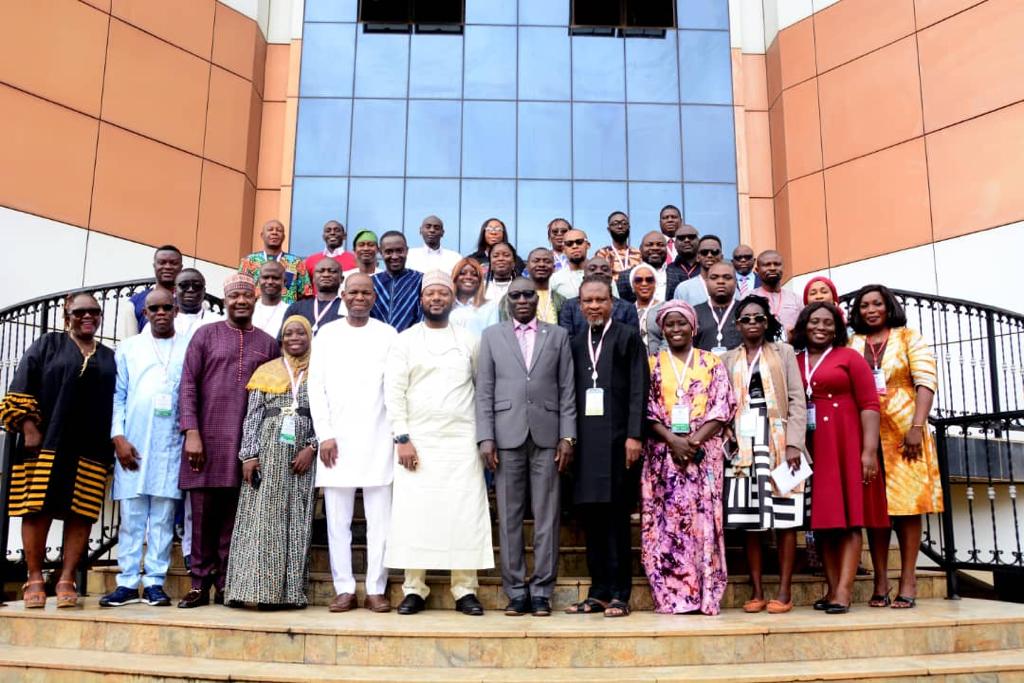
As part of the efforts to curb money laundering and terrorism financing in the West African region, the Intergovernmental Action Group Against Money Laundering in West Africa (GIABA), has organized a three-day capacity building for media practitioners in the region.
Journalists from different ECOWAS nations have converged in Abuja for the training on “Investigative Journalism On Economic and Financial Crimes in West Africa”, which kicked off on Wednesday.
Welcoming participants, the Director General, GIABA, Edwin W. Harris Jr., noted that the hardship occasioned by insecurity and transnational organized crimes had justified the involvement, commitment and efforts of all stakeholders to prevent and combat the scourges underlying money laundering and terrorist financing.
He said: “As you may know, our sub-region is going through a difficult period with regard to the security situation. ECOWAS Member States, like the rest of the world, are suffering from the horrors of acts of transnational organized crime, in particular, migrant smuggling, drug trafficking, embezzlement, corruption and other predicates of money laundering which all fuel violence and terrorism.
“This situation, with its dramatic effects on our member States, therefore justifies the involvement, commitment and efforts of all stakeholders to prevent and combat the scourges underlying money laundering and terrorist financing.”
He noted that the Authority of Heads of State and Government of ECOWAS had established GIABA in 2000 in response to the adverse effects of money laundering on the economies of member states, and to affirm its commitment to the global fight against money laundering and the financing of terrorism.
“In this respect, as a specialized institution, GIABA assists its member states by providing technical assistance.”
Harris Jr noted that since its establishment, GIABA has equally undertaken training and sensitization activities for member states, non-State actors, especially the media, civil society organizations, youths and religious leaders with the aim of fostering their understanding of the fight against money laundering and the financing of terrorism.
“This is part of the implementation of GIABA’s intervention strategy to strengthen and expand the scope of action of stakeholders to non-traditional entities, to ensure a holistic approach to the fight against economic and financial crimes.”
The D.G emphasized that the media, particularly investigative journalists, play a crucial role in uncovering allegations of corruption, promoting good governance, and attracting the sustained attention of law enforcement authorities and the public to the fight against financial and economic crimes.
“In line with its mandate, GIABA has been carrying out sensitization programs for media professionals since 2009, and in 2010 in Abuja, Nigeria established a regional network of investigative journalists specializing in the denunciation of economic and financial crimes.
“Furthermore, in line with the GIABA 2023-2027 Strategic Plan developed in the context of the ever-changing global AML/CFT outlook following the revision of FATF standards and methodology, there has been a focus on the obligation to make regional AML/CFT interventions more effective.
“It aims to contribute to Member States’ AML/CFT efforts and strengthen the engagement of non-state actors and critical sectors playing a crucial role in the effective implementation of AML/CFT measures.
“To this end, it stresses the need for closer and more productive collaboration with the media as you constitute one of the main sources of information and intelligence, both for political decision-makers and for the international information community, both for policymakers and the general public.
“In addition, the media have an essential role to play both in the treatment of general and factual information on crime and in the dissemination of research and studies on the fight against transnational organized crime”, he stated.
The D.G. informed that the workshop further illustrated the many actions deployed by GIABA to continue to strengthen its alliance with media actors and to adopt collective measures in the fight against crimes of all kinds that threaten our Member States.
“This three-day training on investigative journalism related to economic and financial crimes aims to build a strong alliance with the media in a concerted manner for effective dissemination of AML/CFT issues; brief the media on regional AML/CFT initiatives, in particular on the mandate of GIABA; enable trained journalists to improve their research and investigation techniques; promote, within the media, the culture of investigation into ML/FT practices as well as improve the network among journalists in the region to enhance the promotion of good information dissemination on AML/CFT regimes.
To achieve the set objectives, Harris disclosed that relevant themes have been selected and would be presented by eminent regional experts.
“These include, understanding the conceptual issues on money laundering and terrorist financing, techniques and methods of journalistic investigation of financial and economic crimes; the role of the media in promoting good governance as well as the strategies and mechanisms for setting up a regional network of investigative journalists in the field of AML/CFT.”
Adding: “Organized crime knows no borders and all nations must cooperate fully to deal with it. GIABA alone cannot overcome these problems. Whatever efforts we make at the regional level will have little impact without strong national commitments and institutions. We need the support of the various AML/CFT stakeholders especially you the media to carry out our activities in order to prevent criminals from undermining the stability and integrity of our financial systems and economy in general.”
He hoped that the workshop will lead to producing robust recommendations whose effective implementation will enable the media to continue to play active roles in strengthening the AML/CFT regimes in the ECOWAS region.
Resource persons include Dr. Bisi Olawuyi of the Department of Communication and Linguistics, University of Ibadan, Dr Buno Nduka, Manager, GIABA Information Centre, Abidjan, Ms. S. Regina T. Bande and the Coordinator, UCP Manager, GIABA Information Centre, Lagos, Mr Timothy Melaye.






